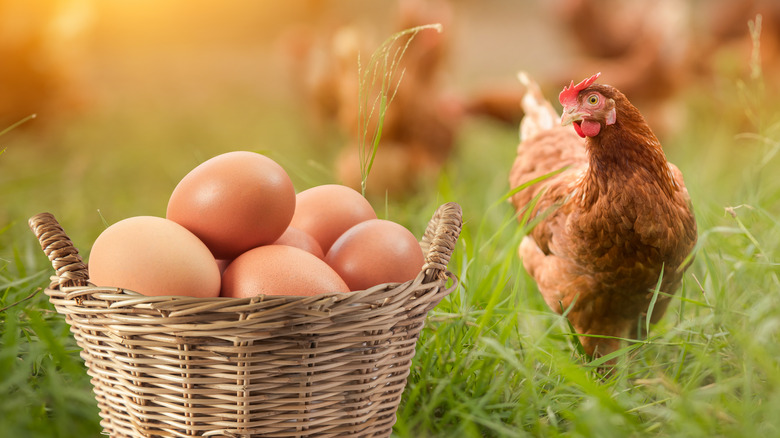Michael Foods Plans To Give Out 'Carbon Receipts' For Do Good Eggs
One of the most controversial aspects of the egg industry is the number of hens that are caged relative to those that are "free range." In the U.S., for example, just 28% of eggs were sourced from cage-free hens as of 2020, according to PBS. While the percentage of cage-free hens is rising and, as PBS reports, is expected to reach 70% in the next few years, the U.S. still lags behind Europe in this regard. In fact, the European Parliament recently voted to ban all caged animal farming by 2027 (via Poultry World).
The issue of environmental impacts generally, and carbon footprints specifically, are arguably a less controversial aspect of the massive worldwide egg industry — per Statista, more than 192 billion eggs were produced globally in 2020. This is due to the simple reason that they're not as pronounced as those of the meat industry, notes The Guardian. But the commercial production of eggs is a significant generator of greenhouse gases, explains Vegan Life Magazine, with operational aspects such as soybean feed and egg packaging contributing to these greenhouse gas emissions and the industry's overall carbon footprint.
At least one major U.S. egg producer, however, has made a major commitment to reducing this carbon footprint.
Do Good Eggs partners with Michael Foods to reduce eggs' carbon footprint
According to a recent press release, Michael Foods, a major U.S. egg supplier, is partnering with Do Good Foods to address both the greenhouse gases and controversial caging associated with eggs. Do Good Foods, previously known for their climate-friendly transformation of landfill-bound surplus groceries into healthy animal feed, will now also produce new Do Good Eggs for humans. These eggs, sourced via Michael Foods, will result in a lower carbon footprint relative to other commercial eggs.
Do Good Eggs, which will be available throughout the U.S. beginning in 2023, will be sourced from cage-free hens and will reduce the carbon footprint by about one pound per dozen eggs, notes the press release. For context, Vegan Life Magazine reports that a dozen eggs typically produce almost six pounds of carbon dioxide. Additionally, per the press release, Michael Foods customers who buy Do Good Eggs will receive a carbon footprint receipt each month, which shows how much their purchases matter in terms of improving our environment.
Climate footprint receipts have been used before in Europe. As Trend Watching notes, online Norwegian grocery store Oda began issuing them in 2020, with a rather remarkable result: People didn't buy as much red meat. That should not be the case, however, with the newer, more sustainable eggs.

